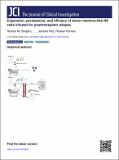Expansion, persistence, and efficacy of donor memory-like NK cells infused for posttransplant relapse
Author(s)
Chen, Jianzhu
DownloadPublished version (4.099Mb)
Publisher with Creative Commons License
Publisher with Creative Commons License
Creative Commons Attribution
Terms of use
Metadata
Show full item recordAbstract
BackgroundResponses to conventional donor lymphocyte infusion for postallogeneic hematopoietic cell transplantation (HCT) relapse are typically poor. Natural killer (NK) cell-based therapy is a promising modality to treat post-HCT relapse.MethodsWe initiated this ongoing phase I trial of adoptively transferred cytokine-induced memory-like (CIML) NK cells in patients with myeloid malignancies who relapsed after haploidentical HCT. All patients received a donor-derived NK cell dose of 5 to 10 million cells/kg after lymphodepleting chemotherapy, followed by systemic IL-2 for 7 doses. High-resolution profiling with mass cytometry and single-cell RNA sequencing characterized the expanding and persistent NK cell subpopulations in a longitudinal manner after infusion.ResultsIn the first 6 enrolled patients on the trial, infusion of CIML NK cells led to a rapid 10- to 50-fold in vivo expansion that was sustained over months. The infusion was well tolerated, with fever and pancytopenia as the most common adverse events. Expansion of NK cells was distinct from IL-2 effects on endogenous post-HCT NK cells, and not dependent on CMV viremia. Immunophenotypic and transcriptional profiling revealed a dynamic evolution of the activated CIML NK cell phenotype, superimposed on the natural variation in donor NK cell repertoires.ConclusionGiven their rapid expansion and long-term persistence in an immune-compatible environment, CIML NK cells serve as a promising platform for the treatment of posttransplant relapse of myeloid disease. Further characterization of their unique in vivo biology and interaction with both T cells and tumor targets will lead to improvements in cell-based immunotherapies.Trial RegistrationClinicalTrials.gov NCT04024761.FundingDunkin' Donuts, NIH/National Cancer Institute, and the Leukemia and Lymphoma Society.
Date issued
2022Department
Massachusetts Institute of Technology. Department of BiologyJournal
Journal of Clinical Investigation
Publisher
American Society for Clinical Investigation
Citation
Chen, Jianzhu. 2022. "Expansion, persistence, and efficacy of donor memory-like NK cells infused for posttransplant relapse." Journal of Clinical Investigation, 132 (11).
Version: Final published version